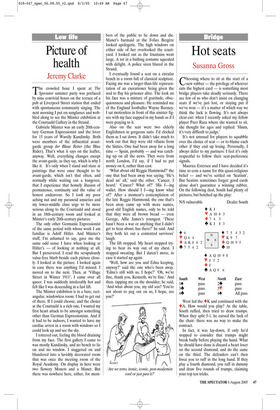Picture of health
Jeremy Clarke
The crowded hour I spent at The Spectator summer party was prefaced by nine convivial hours on the terrace of a pub at Liverpool Street station that ended with spontaneous community singing. The next morning I put on sunglasses and wobbled along to see the Münter exhibition at the Courtauld Gallery in the Strand.
Gabriele Münter was an early 20th-century German Expressionist and the lover for 15 years of Wassily Kandinsky. Both were members of the influential avantgarde group der Blaue Reiter (the Blue Rider). That’s what it says on the leaflet, anyway. Well, everything changes except the avant-garde, as they say, which is why I like it. It’s only when I stand and stare at paintings that were once thought to be avant-garde, which isn’t that often, and normally while waiting out a hangover, that I experience that homely illusion of permanence, continuity and the value of honest endeavour. So I took my poor aching nut and my paranoid anxieties and my lower-middle class urge to be more serious along to the Courtauld and stood in an 18th-century room and looked at Münter’s early 20th-century pictures.
The only other Germanic Expressionist of the same period with whose work I am familiar is Adolf Hitler. And Münter’s stuff, I’m ashamed to say, gave me the same odd sense I have when looking at Hitler’s — of looking at nothing at all. But I persevered. I read the scrupulously value-free blurb beside each picture closely. I looked at the picture. I looked again in case there was anything I’d missed. I moved on to the next. Then, at ‘Village Street in Winter 1911’, I came over all queer. I was suddenly intolerably hot and felt like I was descending in a fast lift.
The Münter exhibition is in a bare, rectangular, windowless room. I had to get out of there. If I could choose, and the choice at the Courtauld is a rich one, I wanted my first heart attack to be amongst something other than German Expressionism. And if it had to be indoors, I wanted to have my cardiac arrest in a room with windows so I could look up and see the sky.
I tottered out, feeling the blood draining from my face. The first gallery I came to was mostly Kandinsky, and no bench to lie on and no window. I staggered on and blundered into a lavishly decorated room that was once the meeting room of the Royal Academy. On display in here were two flowery Monets and a Manet. But there was nowhere here, either, for mem bers of the public to lie down and die. Manet’s barmaid at the Folies Bergère looked apologetic. The high windows on either side of her overlooked the courtyard. I looked out as the fountains went large. A tot in a bathing costume squealed with delight. A police siren blared in the Strand.
I eventually found a seat on a circular bench in a room full of classical sculpture. Facing me was a larger-than-life representation of an executioner being given the nod to flay his prisoner alive. The look on his face was a mixture of gratitude, obsequiousness and pleasure. He reminded me of the England footballer Wayne Rooney. I sat motionless in front of this sinister figure with my face cupped in my hands as if I were praying to it.
Also on the seat were two elderly Englishmen in gorgeous suits. I’d clocked them as I sat down. It didn’t take much to work out that they were old villains from the Sixties. One had been away for a long time — Spain, probably — and was catching up on all the news. They were from north London, I’d say, if I had to put money on it, rather than east.
‘What about old Reggie Hammond?’ the one that had been away was saying. ‘He’s dead an’ all,’ said the other. ‘Cancer, I heard.’ ‘Cancer? What of?’ ‘His f—ing wallet. How should I f—ing know what of?’ After a moment’s contemplation of the late Reggie Hammond, the one that’s been away came up with more names, good old English names, only to be told that they were all brown bread — even George, Alfie James’s youngest. ‘There hasn’t been a war or anything that I didn’t get to hear about, has there?’ he said. And they both let out a contented survivors’ laugh.
The lift stopped. My heart stopped trying to beat its way out of my chest. I stopped sweating. But I daren’t move, in case it started up again.
‘Well, how are you and Edna keeping, anyway?’ said the one who’s been away. ‘Edna’s still with us, I hope?’ ‘Oh, we’re fine, thank you, Kenneth, we’re fine.’ And then, tapping me on the shoulder, he said, ‘And what about you, my old son? You’re not about to peg out on us, I hope, are you?’











































 Previous page
Previous page